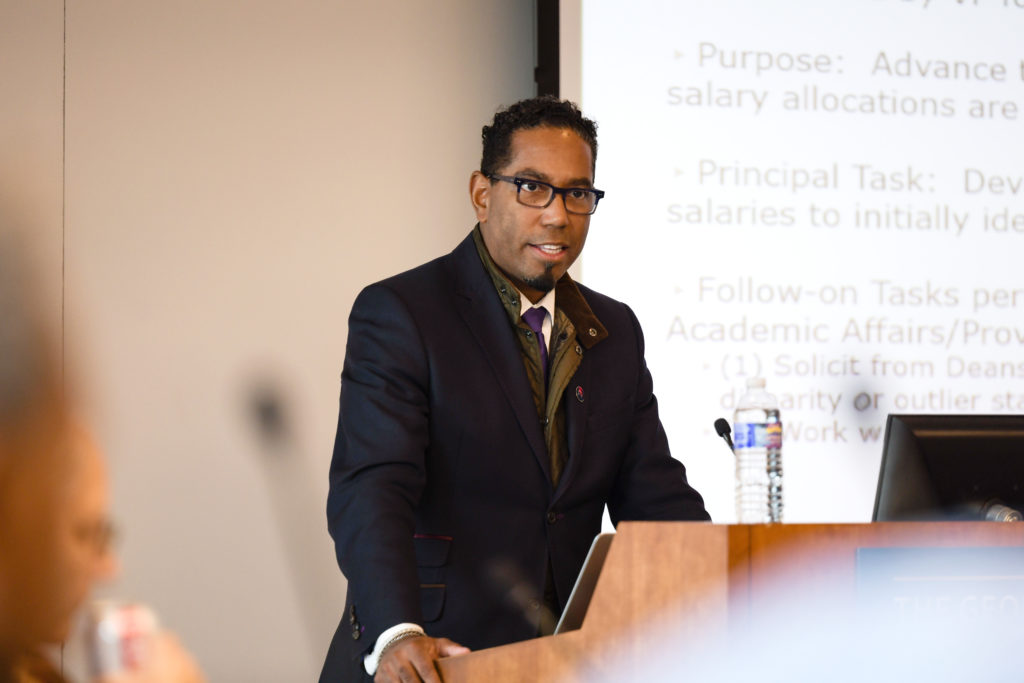This spring marks the first semester for a group of 80 freshmen attending GW due to a deferred enrollment program that GW launched last year.
Officials said they initiated the program during the previous admissions cycle, deferring the 80 students – who were part of the class of regular decision applicants – from the fall to spring semester to create new paths for “academically talented” and “diverse” students. Experts in higher education admissions said universities offer spring deferral programs to enroll applicants when space opens up in residence halls and courses because of students who leave campus to study abroad or unenroll.
Provost Chris Bracey said students are willing to wait until after the fall semester to matriculate into GW. He said officials will offer the “full benefits” of a GW education to students who enroll in the spring, adding that they participated in an orientation that included panel discussions, academic briefings and a resource fair after arriving on campus last month.
“We are pleased GW remains a University of choice for many and are confident that we will be able to offer the full benefits of a GW education to all students, regardless of which semester they begin their academic journey,” Bracey said in an email.
New York and Tulane universities, both peer schools of GW, advertise that they accept students for the spring semester whom they could not accommodate in the fall. Syracuse University allows students to apply to enroll in the spring semester.
Tatum Tatch, a freshman student studying international affairs who enrolled this spring, said she spent a “productive” fall semester in Madrid, Spain, where she participated in a Spanish immersion program and took virtual community college courses like anthropology and economics. She said taking online courses that fulfill course requirements for her major facilitated her academic transition to GW.
She said studying abroad and adjusting to life outside her home state of California prepared her to attend college in an entirely new D.C. environment.
“The experience of getting thrown into a country where you don’t know anyone prepared me for college in general,” Tatch said. “I don’t feel nervous or anything coming in here as far as moving away from home.”
Tatch said after receiving her acceptance email from GW last spring, she connected with a friend from her hometown at GW and contacted other spring-admitted students via Instagram, which eased her social transition to campus life in 2023.
She said she was worried about falling behind on coursework during the semester off in the fall and considered enrolling in another university, but she was “drawn” to GW due to the international affairs program and its location in a major city. She said she is happy about her decision to enroll at GW in the spring because she was able to study abroad in the fall, which the University encourages for international affairs majors.
“I wouldn’t have the opportunity to travel abroad or heal a lot of burnout I had from high school or just take time to reflect on the stuff I wanted to do like in college,” Tatch said. “I don’t really feel behind.”
Experts in higher education admissions said study abroad and attrition, when students leave before completing their degree, create open space on campus that spring entry programs can fill.
Kristin Guidry – a coordinator for Tulane University’s Spring Scholars program for freshmen to start in the spring – said students in the program often spent the fall working, traveling or volunteering, which helps prepare them for living independently and taking on new responsibilities.
“Many students are asking for the opportunity to delay the start of their college career until January to ensure they are prepared to be successful at the university level,” Guidry said.
Guidry said spring admission provides new opportunities for universities to admit students who are qualified and passionate about the institution but cannot start in the fall due to a lack of space on campus.
“For us, our challenges are centered around housing, as our students live on campus for at least their first two years, and classroom space,” Guidry said.
Guidry said Tulane provides spring-enrolled students with the same orientation program as those who started in the fall and guarantees them on-campus housing. She said delayed sorority and fraternity recruitment in the spring semester, like GW’s, also ensures they have the same social opportunities.
“I see spring admits becoming more normalized in the coming years as more schools are hearing from their students that this is the experience they want,” Guidry said.
Anna Lee Buehn, an assistant director of admission for Southern Methodist University, said more competitive higher education institutions across the country have implemented spring admissions programs in response to an increasingly large applicant pool over the past decade.
Officials said they received a record number of freshman applicants for the 2022-23 academic year. College applications across the United States rose 21.3 percent from the 2019-20 academic year to the 2021-22 academic year, according to a Common App report last year.
Bracey said at a Faculty Senate meeting earlier this month that 97.7 percent of freshmen enrolled in the fall semester stayed at GW for the spring semester this academic year.
“For those who did not make that fall freshman class, we truly hold a very special place on this campus,” Buehn said.
Buehn said SMU does not offer virtual courses, restricting enrollment to in-person spots, and students have a two-year residency requirement on campus, which limits the number of spots available in classrooms and campus housing in the fall semester.
GW dropped the on-campus residency requirement for third-year students last month and will only require on-campus living for freshmen and sophomore students.
“We want the best and the brightest,” Buehn said. “We want the students who are going to make the most of the opportunities that exist in this campus.”






